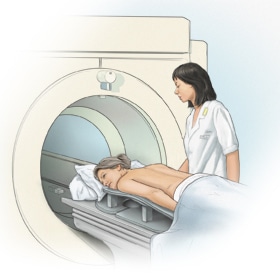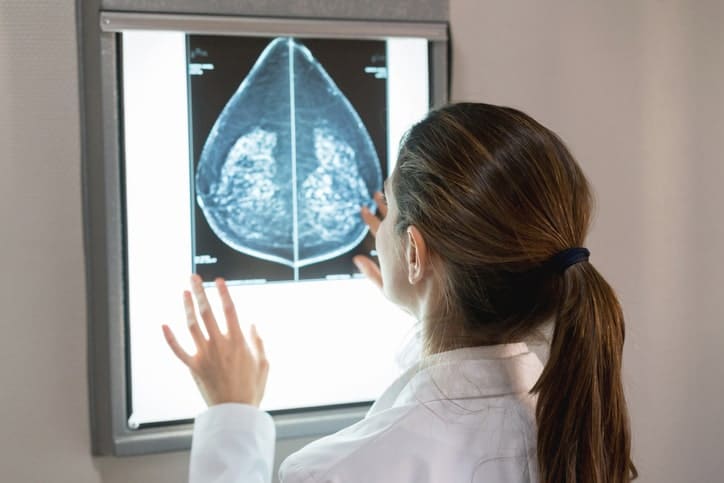What is a breast MRI?

Magnetic resonance imaging (MRI) of the breast is an imaging test that uses strong magnets and radio waves to form pictures of the inside of the breast. It also creates images of the tissues that surround the breast. Breast MRI is used to check for problems, such as a leaking breast implant or a suspicious lump or mass. It can also be used to help determine if breast cancer is present and aid in diagnosis and management. Most MRI tests take 30 to 60 minutes. Depending on the type of MRI you are having, the test may take longer. Give yourself extra time to check in.
Reasons for MRI of the Breast
A breast MRI is more sensitive than mammograms, especially when it is performed using contrast dye. However, a breast MRI may not always be able to distinguish breast cancer from noncancerous breast growths. This can lead to a false positive result. MRI also cannot pick up tiny pieces of calcium (microcalcifications), which mammograms can detect. A biopsy may be necessary to confirm the results of a breast MRI. Breast MRI may be performed for many reasons. An MRI of the breast can:
- Check for more cancer in same breast or other breast after diagnosis.
- Distinguish between scar tissue and tumors in the breast.
- Evaluate a breast lump (usually after biopsy).
- Evaluate an abnormal result on a mammogram or breast ultrasound.
- Check for possible rupture of breast implants.
- Find any cancer that remains after surgery or chemotherapy.
- Screen for cancer in women at high risk for breast cancer (strong family history).
- Screen for cancer in women with very dense breast tissue.
- Show blood flow through the breast area and blood vessels in the breast area.
Women at a High Risk for Breast Cancer
The American Cancer Society recommends breast magnetic resonance imaging screens for women at high risk for breast cancer. A high risk for breast cancer is typically due to a strong family history. A strong family history is usually a mother or sister who has had breast cancer before age 50. It can also be aunts or cousins, including those on your father’s side. Relatives who have had ovarian cancer also increase your risk. Your radiologist or primary care doctor can look at your family history and determine if MRI screening may be appropriate for you.

Preparing for MRI of the Breast
Before your MRI test, patients should follow your normal daily routine unless your provider tells you otherwise. You may need to stop eating or drinking. Each health care facility has its own guidelines on this. It also depends on the type of exam you are having. Ask your health care provider if you should stop eating or drinking before the test. You should also ask your provider if you should stop taking any medicine before the test.
Jewelry and other accessories should be left at home, or removed prior to the MRI scan. They can interfere with the magnetic field of the MRI unit, metal and electronic objects are not allowed in the exam room. MRI uses strong magnet, and metal is affected by magnets and can distort the image. The magnet used in MRI can cause metal objects in your body to move. If you have a metal implant, you may not be able to have an MRI unless the implant is certified as MRI safe. People with these implants should not have an MRI:
- Inner ear implants or hearing aids
- Certain clips used for brain aneurysms
- Certain metal coils put in blood vessels
- Most defibrillators
- Most pacemakers
Before MRI Testing You Should Know
If you have claustrophobia (fear of enclosed spaces) or anxiety, you may want to ask your physician for a prescription for a mild sedative prior to the scheduled examination. If sedation is used, it is required that you arrange for a relative or friend to drive you home after the exam. The radiologist or technologist may also ask you if you have any of the following:
- Had a stereotactic breast biopsy
- Artificial body part (prosthesis)
- Metal rods, screws, plates, or splinters in your body
- Wear a medicated adhesive patch
- Tattoos or body piercings. Some tattoo inks contain metal.
- Implanted nerve stimulators or drug-infusion ports
- Braces. You must remove any dental work.
- Unremoved shrapnel or bullet fragments
- Worked around metal and/or have had fragments in your eye(s)
Tell the radiologist or technologist if you:
- Are allergic to X-ray dye (contrast medium), iodine, shellfish, or any medicines
- Are pregnant or think you may be pregnant
- Have a fear of small, enclosed spaces (claustrophobic)
- Have any serious health problems.
- Had previous surgeries
- Are breastfeeding
Breast MRI Procedure
For the MRI, you may be asked to wear a hospital gown and may be given earplugs to wear if you desire. You will be moved into the magnet of the MRI unit and the technologist will perform the examination while working at a computer outside of the room. The entire examination is usually completed within 45-60 minutes.
You may be injected with contrast, a special dye that makes the MRI image sharp.

If an intravenous contrast material is used, you will feel a pin prick when the needle is inserted into your vein. Some patients may sense a temporary metallic taste in their mouth after the contrast injection.
During a breast MRI, you lie face down on a platform that slides into a tubelike machine called a scanner. You’ll be on your stomach with your breasts placed through openings in the platform. It is important that you remain perfectly still while the images are being obtained. You will know when images are being recorded because you will hear and feel loud tapping or thumping sounds. Earplugs or headphones are provided to reduce the intensity of the sounds made by the MRI machine. Be sure to let the technologist know if something is uncomfortable since discomfort increases the chance that you will feel the need to move.
What To Expect After MRI
After the MRI procedure, you can get back to normal activities right away. If you were given contrast, it will pass naturally through your body within a day. You should drink lots of water so that the dye passes quickly out of your body. Otherwise, you should feel more comfortable after the procedure.
Breast MRI Results
Your health care provider will discuss the test results with you during a follow-up appointment or over the phone.
